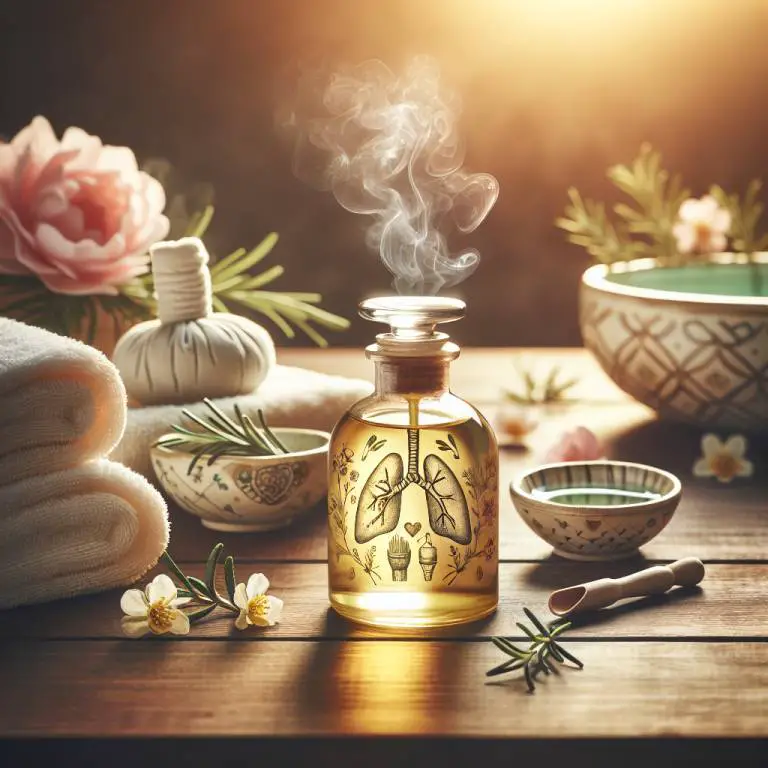Herbal teas and humidity: A combination for asthma relief?
Drinking herbal teas in high humidity environments can help with asthma symptom relief. The warm steam from the tea may soothe the airways and improve breathing. However, high humidity can sometimes worsen air quality, which might not be good for all asthma sufferers. It’s important to consider personal responses to humidity when trying this method.

What is the Science Behind Herbal Teas Providing Asthma Relief?
Herbal teas have been used for centuries to provide relief from various ailments, including asthma. The science behind this lies in the natural compounds found in certain herbs that can help relax and open up the airways, making breathing easier for asthma sufferers. These compounds include flavonoids, tannins, and other anti-inflammatory substances that can reduce swelling in the airways and decrease mucus production.
Moreover, some herbs have bronchodilator properties, which means they can help dilate the bronchial tubes in the lungs. This action reduces respiratory resistance and improves airflow to the lungs. Drinking herbal teas can introduce these beneficial compounds into the body in a gentle and natural way, potentially easing asthma symptoms without the need for strong medications.
How Does Humidity Affect Asthma Symptoms?
Humidity plays a significant role in how asthma symptoms manifest. High humidity levels can make the air feel heavier and harder to breathe for individuals with asthma. This is because moist air can trigger swelling in the airways, making them narrower and restricting airflow. Additionally, high humidity can encourage the growth of mold and dust mites, which are common allergens that can exacerbate asthma symptoms.
On the other hand, very low humidity levels can also be problematic for people with asthma. Dry air can irritate the mucous membranes in the airways, leading to increased coughing and discomfort. Maintaining an optimal level of humidity is crucial for those with asthma to minimize their symptoms and improve their overall respiratory health.
Explore teas that can ease asthma naturally. Learn about their benefits and how to brew them.
Can Drinking Herbal Teas in High Humidity Environments Improve Respiratory Health?
In environments with high humidity where asthma symptoms might be aggravated, drinking herbal teas could offer some relief by harnessing their anti-inflammatory and bronchodilator effects. The warm vapor from hot tea may also help loosen mucus in the chest and soothe irritated throat tissues, providing additional comfort during humid conditions.
Furthermore, certain herbal teas possess antihistamine properties that could be beneficial in high humidity settings where allergens like mold spores are more prevalent. By naturally reducing histamine levels in the body, these teas might help mitigate allergic reactions and improve respiratory health among asthma sufferers living or working in humid climates.
What Are The Best Types of Herbal Teas For Asthma Sufferers?
Ginger tea is highly recommended for individuals with asthma due to its potent anti-inflammatory properties that can help reduce airway inflammation. Ginger also has mild bronchodilator effects which may aid in easing breathing difficulties associated with asthma.
Mint tea is another excellent choice for those suffering from asthma. Mint contains menthol, a natural compound known for its ability to relax smooth muscles in the respiratory tract and promote easier breathing. Additionally, mint’s refreshing flavor makes it not only a therapeutic option but also an enjoyable one.
| Herbal Tea | Benefits for Asthma | Considerations in High Humidity |
|---|---|---|
| Ginger Tea | Anti-inflammatory properties may help reduce asthma symptoms. | High humidity can enhance the soothing effect, but ensure air quality is not compromised by mold growth. |
| Peppermint Tea | Natural antihistamine; may relieve congestion and improve breathing. | In high humidity, stay hydrated as peppermint can be mildly diuretic. Watch for mold and allergens in the air. |
| Licorice Root Tea | May ease respiratory issues by reducing bronchial spasms and inflammation. | Avoid excessive consumption in humid conditions to prevent exacerbation of hypertension or heart disease risk. |
| Eucalyptus Tea | Contains eucalyptol which helps break down mucus and improve airflow. | Maintain indoor air quality to prevent eucalyptus aroma from becoming overwhelming in high humidity. |
| Green Tea | The antioxidant quercetin may help block allergic responses affecting asthma. | Increase fluid intake as both caffeine and high humidity can lead to dehydration. |
| Mullein Tea | Soothes the respiratory tract and reduces inflammation in the airways. | Ensure proper ventilation when brewing in high humidity to avoid dampness that could promote mold growth indoors. |
How does air quality influence the effectiveness of herbal teas on asthma?
Air quality plays a significant role in how effective herbal teas can be for asthma relief. When the air is polluted, it can irritate the respiratory system. This makes it harder for asthma sufferers to breathe. Herbal teas may help soothe these symptoms, but their effectiveness can be limited if the air remains contaminated.
Clean air, on the other hand, enhances the benefits of herbal teas. In environments with good air quality, the natural ingredients in herbal teas can work more efficiently to reduce inflammation and ease breathing difficulties. It’s like giving your lungs a helping hand in fighting off asthma triggers.
Are there any risks associated with consuming herbal teas in humid conditions for asthma patients?
Drinking herbal teas in humid conditions poses some risks for asthma patients. High humidity levels can make the air feel heavier, making it more difficult to breathe. For someone with asthma, this can exacerbate symptoms despite the soothing effects of herbal tea.
Moreover, humidity encourages the growth of mold and dust mites, which are common triggers for asthma attacks. Consuming herbal teas in such environments might not be enough to counteract these potent triggers. It’s important for asthma sufferers to monitor humidity levels and manage their environment accordingly.
What lifestyle changes can complement the benefits of herbal teas and humidity for asthma relief?
Maintaining a clean living environment is crucial for complementing the benefits of herbal teas and managing humidity levels for asthma relief. Regularly cleaning your home to remove dust, pet dander, and mold reduces exposure to common triggers. Using dehumidifiers can also help maintain optimal humidity levels indoors.
Incorporating regular exercise into your routine can improve lung function and overall health, making it easier to manage asthma symptoms. However, it’s important to choose activities that are suitable for your fitness level and indoor environments when outdoor air quality is poor or humidity levels are high.
Final Thoughts
The effectiveness of herbal teas for asthma relief is influenced by several factors including air quality and humidity levels. While these natural remedies can offer significant benefits, they should be part of a broader strategy that includes managing environmental triggers and making healthy lifestyle choices.
Asthma sufferers should always consult with healthcare professionals before trying new treatments or making significant changes to their lifestyle or environment. By taking a comprehensive approach that includes both traditional and alternative therapies, individuals with asthma can find better ways to manage their symptoms and improve their quality of life.






